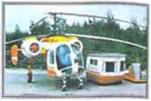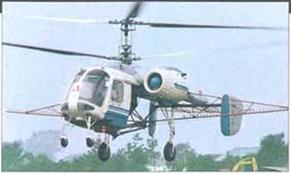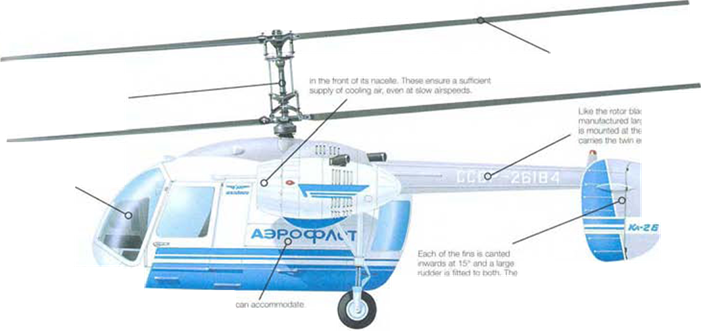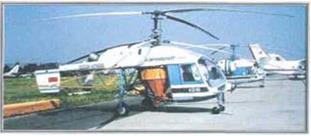• Co-axial rotor system • Multi-role versatility • Twin piston engines
First flown in 1965, the Ka-26 is widely used as an agricultural, ambulance, fire-fighting, survey and search and rescue helicopter. Its adaptability is largely a result of its unusual configuration. The piston engines are mounted on short wings and this allows a variety of payloads, including chemical spraying equipment, to be mounted aft of the enclosed cabin. It is a very compact design because the contra-rotating rotors mean that a tail rotor is not required.
Kamov Ka-26 ‘Hoodlum’
▼ Turhoshaft conversion

 After developing the Ka-126. Kamov passed responsibility for tho production to IAR in Romania. Some customers havo had their older Ka-26s modified to Ka-126 standard.
After developing the Ka-126. Kamov passed responsibility for tho production to IAR in Romania. Some customers havo had their older Ka-26s modified to Ka-126 standard.
A Compact people carrier
 Even when configured for the carnago of seven passengers, the Kn-26 is a remarkably small helicopter. Few Russian aircraft havo been exported so successfully.
Even when configured for the carnago of seven passengers, the Kn-26 is a remarkably small helicopter. Few Russian aircraft havo been exported so successfully.
FACTS AND
Kamov announced the Ka-26 in 1964 and the aircraft entered large-scale agricultural use in the USSR in 1970.
► Search-and-rescue variants have a winch for towing rescue boats.
► Full instrumentation is provided for flying by day or night, and in all weathers.
FIGURES
>• In 1962 Ka-26s joined other holicopters transporting demolition teams whose ta*k was to keep Soviet rivers free of ice.
A towed ‘bird’ receives reflections from tho omitter of the prospecting version.
All payloads are carried at the Ка-гб’з centre of gravity.
|
|
|
Ka-26 ‘Hoodlum-A’
Type: general-purpose *ght hcf-coptot
|
|
 |
|
Powerplant: two 242.5-kW <325-hp.) Vedeneyev M-14V-26 nine-cylinder air-coolod radial piston engines
|
|
|
Maximum speed: 170 km/h (105 m. p.n,)
Range: 400 km (250 mi.) with seven passengers
Hover ceiling: BOO m (2.625 ft.) out of ground effect
Weights: empty ш passenger configuration 2100 kg (4.620 lb.); maxxnum take-oft 3250 kg (7.150 *>.)
Accommodation: ,- iiot plus seven passengers, up to 1065 kg (2.340 lb) ot chermcaia or cargo, or an 1100-kg (2500-lb) externally slung toad
Dimensions:
rotor diameter 13 m (42 ft. 7 kv)
fuselago length 7.75 m (25 It 5. in,)
height 4.05 m (13 ft. 4 л)
mam rotoi c*sc area 265.50 m-‘ (871 sq. ft)
|
|
|
McDonnell Douglas І Іеік optcTs,
Kamov intended to use this sysfem in the development of the Kd-I1R. which was planned as a live-seat Inisiness heltcttpler with (ust one main mlor.
By 1993 nearly 900 Ka-26s had Ічеп Innlt and pnxlm tit in For crop-spraying the Ka-26 can carry 900 kg (200 lb.) of liquid. was continuing at tlu Kumettaou and when used as a duster capacity increases by 165 kg (360 tb.). Aviation l’r< situ non VvMH i. ition Most Russian Ka-26s are used to treat orchards and vineyards. With iLs strength and versatility, the НіхнІІит’ is likely to remain In чс-іл ісе for many years
|
|
|
Kamov woo one of t»¥> *rst hdcoptor manulach/ers to use glass rotnfotceO plastic (GRP) rotor bfcxJes Thw wtsgh only 25 kg (55 to) each and aro do icod by an Mcohcf-gS’Cerino mortunt.
|
|
|
|
|
Each of the ar-cooted engnes has a largo fan «tod
|
|
|
|
|
Uk« if* K-M. u, tho Кх-г-6 ■» used m а Іу-г«з enre Tha JetRunger m can U*o tinroport »bng toads, but nether ot mo Amoncan notcoptcn con match the veraatikty ol tho Ka-28, wtnen it abh to curry tovan pnsengee о» *y їм ■ cram
|
|
|
The Ka-?6 ueou ifw сп-.млі rmma – rotntuvj rotor system which he iwt been used on the natter Ka-25 ‘Hormone’.
|
|
|
UK. the taOboortto are >ofy trwn GRP A tmtr<ar«i rea» of tha booms and xioaie fne and nxxxera
|
|
|
Gpemlx i;’ ere nc*mа»/ Поля by a inge і apt txit a second ptot or poismgor can do SOOiGti m tho catxn, Atucn N kghtiy ctwurawJ Aflltutmode* flOW an er fitter b-,Y4om wtUdl (Х9МУ1Ч cfiemcnl* (rc*tt entorng Iho cockpit.
|
|
|
ІІ Й N0001UM 2068 JfTRAttMR N1 ( MAX
7 p*uc»g*n 4 pjuoqon 0 panxngtn
|
|
|
|
|
Л» a wwciaHoc Afesr the К Max can carry in* grMto»t wung П he no f*сЛТу for оаиагдт howew. end л thomforo *mod M a much narrower mnmel man th* vrrentile Ka -2в TheRu*«inn de*xjn ha» 1* qreaeei cea-carmxj аЫЛу than the JetRjngrw
|
|
|
Wtst 4t «rrxan. UX surety w-ieg orvxr cart ope «» ha-20 n uuo to carry a Wet у of [ «&YWts, attached "Kry to 1 r-riage
WPA^entto. or Цч, Л OhV
tne rax wt. ee», two txrftos.
|
|
 |
|
oxtemol skm st*te*irtg rte on trie taipane aro a chamctonstic loah/e of die Ka 26 Titeyww» (vuvmrsfy used. tx« lo a tossur ОХІОГЧ. ОГ1 tlw K;» ?ft
|
|
|
This oetachacfe poo ви passengers. в fas abo boon uoco to transport frame*» and со demoHon teams.
|
|
|
|
|
IU-2S HOOOtUM 1100 k| (2.200 lb.)
|
|
|
|
 |
|
тг*Ка-М**дм portormance « intone* to lh»a о7 it» Wtow*m nva4 (Wi its crtson engine», tho Sonet hetccotor does not hive 0» altitude оцзаыгмп o( th* tortxno-angnod macftnoe. The poo* pwrtominnce kto to development ottheKe-120.
|
|
|
■ HUGHES 300; In 1d83 Scftweize* acquired all rights for the 300. It has since developed a turbine-ef»ned version, the 330. __________________
|
|
|
■ ROBINSON R22 BETA; As ono of tho
world’s most popular basic trainng helicopters. R22 is only occasionally used for spraying
|
|
 |





Kamov

 After developing the Ka-126. Kamov passed responsibility for tho production to IAR in Romania. Some customers havo had their older Ka-26s modified to Ka-126 standard.
After developing the Ka-126. Kamov passed responsibility for tho production to IAR in Romania. Some customers havo had their older Ka-26s modified to Ka-126 standard. Even when configured for the carnago of seven passengers, the Kn-26 is a remarkably small helicopter. Few Russian aircraft havo been exported so successfully.
Even when configured for the carnago of seven passengers, the Kn-26 is a remarkably small helicopter. Few Russian aircraft havo been exported so successfully.



















